“Oh, come on!”
If you go to the movie theatre with me
you should be ready for sudden outbursts.
I could not believe the historical revisionism I was watching in Dances with Wolves (Kevin Costner, 1990). Reading political correctness back into a narrative from 150 years ago, one would think the culture of one group was pure while another culture came from hell itself. All the way through the film I was muttering, uttering distain for the subversion of history.
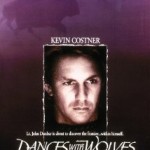 I expect to see pulpits on Sunday morning. I expect to hear preaching on Sunday morning. I do not need to see the first and hear the second when I go to the movie theatre.
I expect to see pulpits on Sunday morning. I expect to hear preaching on Sunday morning. I do not need to see the first and hear the second when I go to the movie theatre.
Chelsea, my daughter, was home from college. She and I went out to chat over dinner, afterward to a heist film The Italian Job (F. Gary Gray, 2003). The theatre was full; we sat near the front. The movie was just what we expected: fun and exciting. But three quarters of the way through, the script set up a pulpit and called in the preacher. In an offhanded, out-of-the-blue comment, it was stated that Christopher Columbus “wiped out America’s indigenous population.”
“Oh come on! Give me a break! Go read the primary sources!” I bellowed from my seat. Everyone in the theatre heard me. My 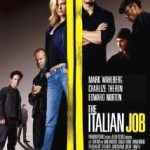 daughter, thoroughly embarrassed, formed a fist, beat my shoulder, and whispered over and over, “Daddy! Shut up! Daddy! Shut Up!”
daughter, thoroughly embarrassed, formed a fist, beat my shoulder, and whispered over and over, “Daddy! Shut up! Daddy! Shut Up!”
I expect pulpits and preaching in the sanctuary. I expect screens and stories in the theatre. The two should remain separate.
 Hollywood has its own preachers. Noah (Darren Aronofsky, 2014) is one such sermon. My comments were written on a friend’s Facebook thread a few days after I saw the movie on the big screen.
Hollywood has its own preachers. Noah (Darren Aronofsky, 2014) is one such sermon. My comments were written on a friend’s Facebook thread a few days after I saw the movie on the big screen.
When a purportedly biblical movie begins with a “rite” which depends on a luminous, coiled snake skin, the Christian should immediately begin to recoil. As I took notes throughout the film, much of what I saw and heard twisted the essence of the biblical account beginning not in Genesis 6 but in Genesis 3. . . . Our response to everything should go back to identify (1) God’s original intention in Genesis 1-2 and (2) human’s original corruption in Genesis 3-4. When we compare every notion and idea with these foundation stones, we can then turn to The Cornerstone, who will apply Heaven’s escape, beginning in Genesis 3:15 “and He will crush [satan’s] head” (Rom 16.20).
I wrote to another friend that I found the movie to be “long, laborious, convoluted, an amalgum of the Bible, Kabbala, and 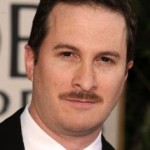 paganism. Ultimately ‘The Creator’s’ wish for justice was overcome by ‘man’s mercy.’” Aronofsky was preaching. Noah was his pulpit.
paganism. Ultimately ‘The Creator’s’ wish for justice was overcome by ‘man’s mercy.’” Aronofsky was preaching. Noah was his pulpit.
Christians must be aware of Hollywood preaching but revel in Hollywood storytelling. Stories compel me. Characters, words, and situations burrow inside my brain. Preaching propositional truth engages my mind, storytelling truth “breaches” my person. “Breaching” means that truth has assaulted my insides, the Trojan horse within the gates of my life. “Breaching” means that I am persuaded without twisting my arm. 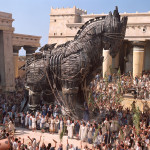 “Breaching” means I am won over without selling me a product. Preaching confronts. “Breaching” convinces.
“Breaching” means I am won over without selling me a product. Preaching confronts. “Breaching” convinces.
Melissa Leo convinces me to feel for her character in Frozen River (Courtney Hunt, 2008). I am compelled to think of others, to consider what I would do in the same situation. Double Indemnity (Billy Wilder, 1944) questions human motivation through “breaching.” What happens if I take what I want? How will I react if everything falls apart in the end? Where will my actions impact others? These questions 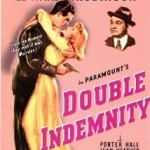 breach the city gates of my spirit.
breach the city gates of my spirit.
The Perks of Being a Wall Flower (Stephen Chbosky, 2012) “breaches” the question of what it means to love our homosexual neighbor. Schindler’s List (Stephen Spielberg, 1993) rightfully makes us recoil, reminding us to say “Never again.” Gran Torino (Clint Eastwood, 2008) explains that justice may be gained best through sacrifice. We Were Soldiers (Randall Wallace, 2002) takes us to the battlefield, compels our gratitude, and honors all soldiers who die for their country. Charlie Chaplain’s Modern Times 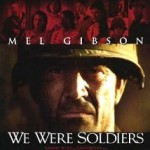 (1936) lacerates our conscience when work devolves into using people as producers.
(1936) lacerates our conscience when work devolves into using people as producers.
When I watch a movie I expect to be told a story, I expect breaching. When I go to worship with my church on Sunday, I expect to hear preaching. Truth can be delivered in both ways yet the two ways should be kept separate.
But if a movie breaches my person, I may enter either the choir loft or the confessional, when the lights come up.
Mark still yells at movie screens for one reason or another. This article is now part of Mark’s book When the Lights Go Down. Dr. Mark Eckel is president at The Comenius Institute and teaches his students about media at Capital Seminary & Graduate School.


The movies are a dangerous place where sharp ideas are thrown around and unsuspecting moviegoers go about catching them as if they are as innocent and mild as soap bubbles.
The preaching that takes place vaguely hidden in most movies today reminds me of quote from Socrates (delivered through Plato):
“Surely, I said, knowledge is the food of the soul; and we must take care, my friend, that the Sophist does not deceive us when he praises what he sells, like the dealers wholesale or retail who sell the food of the body; for they praise indiscriminately all their goods, without knowing what are really beneficial or hurtful: neither do their customers know, with the exception of any trainer or physician who may happen to buy of them . . . For there is far greater peril in buying knowledge than in buying meat and drink: the one you purchase of the wholesale or retail dealer, and carry them away in other vessels, and before you receive them into the body as food, you may deposit them at home and call in any experienced friend who knows what is good to be eaten or drunken, and what is not . . . But you cannot buy the wares of knowledge and carry them away in another vessel; when you have paid for them you must receive them into the soul and go your way, either greatly harmed or greatly benefited.”
Plato, Protagoras, 313c-314a.